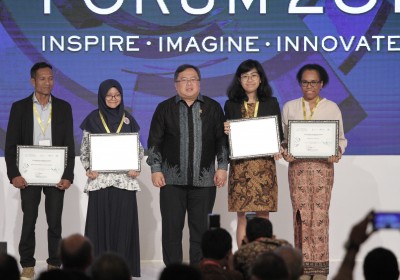Fostering the Seeds of Entrepreneurship, the Government’s Way
May 14, 2019
Founder of Walibu Social Enterprise, Herlina Acane Yawang (rightmost), receiving an award from the Minister of PPN, Bambang Brodjonegoro, at the Indonesia Development Forum 2018.
Based on the survey from the United Nations Economic and Social Commission for Asia and the Pacific (UNESCAP), there are 342 thousand social enterprises in Indonesia. Hundreds of thousands of these social businesses experience various challenges, among others; 47 per cent of social enterprises in Indonesia suffer from initial capital problems, 32 per cent have difficulties accessing funding, 31 per cent have managerial issues, 29 per cent are having trouble recruiting employees, and 27 per cent suffer from production capacity issues.
To address the said challenges, there need to be breakthroughs in building the capacity of social entrepreneurship in Indonesia.
The Government of Indonesia can play a number of key roles in this area. The Minister of National Development Planning/Head of National Development Planning Agency (Bappenas), Bambang Brodjonegoro, said one of them is by creating enabling environment, encouraging social entrepreneurs to grow and reach their potentials.
“By creating a conducive environment, Indonesia can encourage programs to grow and sustain seeds of future social entrepreneurship since an early age,” said Minister Bambang Brodjonegoro, cited from his welcoming remarks at the publication of Developing an Inclusive and Creative Economy: The State of Social Enterprise in Indonesia, co-published by the British Council and UNESCAP on 2019.
Since most social entrepreneurs are youth, said Bambang, programs to develop social entrepreneurship talent can start as early as in college. Collaborating with accelerator and incubator institutions, future social entrepreneurs would receive training, from obtaining business experience to building their own business models.
Business incubators and accelerators are institutions or companies facilitating startup businesses, starting from the workplace, business training, mentoring, and initial funding. Using this step, social enterprises are predicted to incur less cost than using an independent route.
An example of social enterprise born from the university is Walibu, a startup company under the wings of Tech Incubator Skystar Ventures of Universitas Multimedia Nusantara (UMN). Herlina Acane Yawang, the winner of the IDF 2018’s Blog Competition, established Walibu to preserve the Noken craft from Papua. They empower Papuans to make their unique crafts and add to their income.
"Walibu is here with its #SmallActionForBigSmile campaign to help traditional crafter moms in Papua market these Noken bags through the online platform,” said Herlina on the Idea and Innovation Marketplace at Indonesia Development Forum 2018, mid-July of last year.
Read: https://indonesiadevelopmentforum.com/2018/article/5106-walibu-inkubator-bisnis-umn-terpilih-finalis
Social enterprises conceived from universities are in fact able to bring larger impacts to the society. The application Pasarlaut.com managed by PT Aruna, for example, is a result of the Technological Business Incubation program held by the Ministry of Research, Technology, and Higher Education (Kemenristekdikti). They mentored fishers on coastal areas outside of Java, like in Sumatera, Kalimantan, Maluku, and Papua. Through this application, prices received by fishers can averagely be 20 per cent higher than the regular market.
Another government role is completing social entrepreneurship-enabling ecosystem regulations. Bambang mentioned that one example is accelerating the enforcement of Entrepreneurship Law that becomes the basis for social entrepreneurship in Indonesia. In addition, the government can also actively identify regulations hindering the potential of social enterprises. The next task for the government is to facilitate discussions and information exchanges among all stakeholders to produce regulation amendments according to their needs.
Another important aspect that can be facilitated by the government is developing alternative financing models for social entrepreneurship. Bambang explained that there are many potential alternative financing schemes, like grants, investments, securities, and crowdfunding, all of which need to be explored and developed to ensure the sustainability of socially impacting business models.
Externally, Bambang is aware that the government of Indonesia still need to learn about the economy and social entrepreneurship from other countries, England for instance. In this European country, the profit of social entrepreneurship is used to develop businesses and empower communities, not amassing riches of its owner.
To achieve the goals of the national development agenda, the government is committed to serve as an active partner for social entrepreneurs and continue to build and maintain its ecosystem. The Government of Indonesia, through Bappenas, is ready to receive inputs and convene all stakeholders to strengthen social entrepreneurship. One of the forum used is the Indonesia Development Forum (IDF).
IDF 2019 highlights the theme of “Mission Possible: Seizing the Opportunities of Future Work to Drive Inclusive Growth” with eight sub-topics. One of which is mentoring social entrepreneurship in its actors. This topic is developed by finding ways to support social enterprises in Indonesia and formulate the appropriate policies and approaches to building social entrepreneurship capacity, including in remote areas.
This international forum is supported by the the Government of Australia through Knowledge Sector Initiative and convenes social enterprises, local governments, and grant providers. In IDF 2018, the British Council presented the benefits of social entrepreneurship, which not only generated financial profit, but also other benefits such as community empowerment, environmental conservation, and also cultural preservation.
The same goes for IDF 2019. This year’s conference is giving opportunities for social enterprises and communities to join in to talk about a business that is profitable while empowering the community at the same time. Prepare yourself with the best solution to create business opportunities aiming to drive an inclusive and sustainable economy in Indonesia.**
Indonesia’s Research Institutions Supporting the Development of the Electric Vehicle Industry
Indonesian Muslim Fashion and Cosmetics IKMs Shine at Dubai World Expo 2020
Govt Steps Up UMKM Transformation Efforts in the Midst of Pandemic Slowdown
Govt Encourages Promotion of IKM Products in Digital Era
Government Begins Developing Maritime Training Center in Makassar
Tweets by IDDevForum
